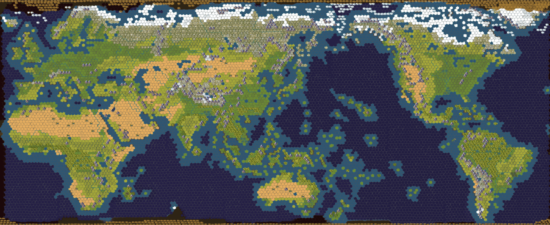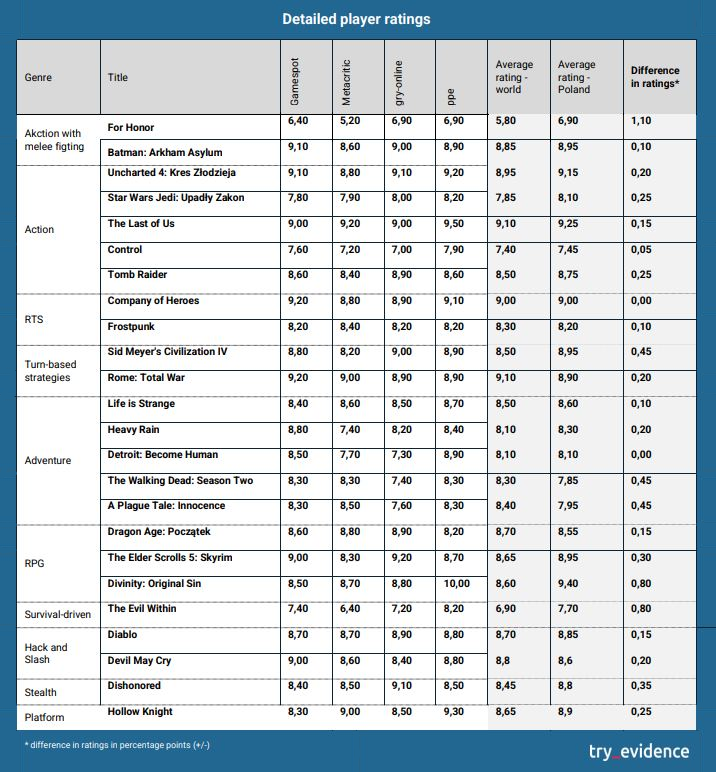Do Polish Gamers Rate Games Differently Than Foreign Ones?
- July 9, 2021
- Try Evidence Research Team
Categorizing Games as Culturally Dependent or Independent
We categorized the games selected for analysis into two groups: culturally dependent and culturally independent.
Culturally dependent games are deeply rooted in the culture or history of a specific country or region.
Players from specific cultural backgrounds may find it easier to relate to the themes and stories in certain games. This connection, based on shared cultural experiences, could influence how they rate these games—not just by quality but also because of the cultural bond. Video games are shaped by the culture in which they are created, meaning they aren’t made or experienced in a vacuum. They are deeply connected to the social, cultural, and historical contexts of their time and place. As a result, games reflect the values, stories, and ideas of the societies that produce them. In other words, games are products of their environment, carrying influences unique to that setting. Because of this, players from different cultural backgrounds may not always fully understand or appreciate these games in the same way.
Therefore, we hypothesized that, in extreme cases, cultural influence could significantly shape a game’s reception. Games with a strong cultural focus might even seem unappealing or difficult to understand for players outside that cultural context.
Culturally independent games present universal themes that appeal to a broad audience.
These games tackle subjects that any gamer can relate to or easily understand.
Each category included 24 games. We ensured an even distribution of genres between the culturally dependent and culturally independent groups. The selection process involved internal discussions at Try Evidence, input from industry professionals and researchers, and conversations with gamers to refine our choices.
Culturally Independent Games for Analysis

We categorized the following games as culturally independent, meaning their themes and gameplay are universally relatable:
Action:
- Uncharted 4: A Thief’s End (Naughty Dog),
- Star Wars Jedi: Fallen Order (Respawn Entertainment),
- The Last of Us (Naughty Dog),
- Control (Remedy Entertainment),
- Tomb Raider (Crystal Dynamics).
Action with Melee Fighting:
Hack and Slash:
Platform:
Adventure:
- Life is Strange (Dontnod Entertainment),
- Heavy Rain (Quantic Dream),
- Detroit: Become Human (Quantic Dream),
- The Walking Dead: Season Two (Telltale Games),
- A Plague Tale: Innocence (Asobo Studio).
RTS:
Stealth:
Turn-Based Strategy:
Survival-Driven:
RPG:
- Dragon Age: Origins (BioWare),
- The Elder Scrolls V: Skyrim (Bethesda),
- Divinity: Original Sin (Larian Studios).
The culturally independent games we selected showcase how universal themes and gameplay mechanics can appeal to players across the globe. These titles go beyond cultural boundaries by drawing on shared human experiences such as adventure, conflict, survival, and personal growth. Whether through action, strategy, or emotional storytelling, these games offer something for everyone. They are accessible and appealing to a diverse global audience, therefore can click with people from all walks of life, no matter where they come from.
Culturally Dependent Games for Analysis

The following games were selected as culturally dependent, as they draw heavily on specific cultural or historical contexts:
Action:
- Ghost of Tsushima (Sucker Punch Productions) – Set on the Japanese island of Tsushima, this game puts players in the role of a samurai battling Mongol invaders.
- Hellblade: Senua’s Sacrifice (Ninja Theory) – A game inspired by Celtic and Norse mythology.
- Okami (Clover Studios) – Draws from Japanese beliefs and culture, with artwork inspired by traditional sumi-e painting.
- NieR: Automata (Cavia) – A classic Japanese action game with distinct Japanese mechanics that gained widespread appeal in the West.
- S.T.A.L.K.E.R: Shadow of Chernobyl (GSC Game World) – Based on the Strugatsky brothers’ works and referencing the Chernobyl disaster.
Action with Melee Fighting:
- Darksiders (Vigil Games) – A take on the biblical apocalypse, referencing Christian beliefs and figures like angels, demons, and the Horsemen of the Apocalypse.
- Yakuza 0 (Ryu Ga Gotoku Studio) – Set in Japan, this game centers on criminal organizations and draws from Japanese cultural narratives.
Hack and Slash:
- Jotun (Thunder Lotus Games) – A game inspired by Norse mythology.
- God of War (2018) (Santa Monica Studio) – A game deeply rooted in Scandinavian myths, including gods and iconic characters.
Platform:
- Never Alone (Upper One Games) – Deeply inspired by Inuit culture and folklore, developed with the help of experts to ensure cultural accuracy, incorporating stories of beliefs, such as the Sky People, the Rolling Heads, and the Blizzard Man.
Adventure:
- Paradise Lost (PolyAmorous) – Set in an alternative history post-World War II, where a Polish boy uncovers the secrets of a German bunker.
- 1979 Revolution: Black Friday (iNK Stories) – Focused on the 1979 Islamic Revolution, which led to the overthrow of Mohammad Reza Pahlavi’s dictatorship in Iran. It offers a multi-perspective view of the historical events, including the pivotal moment known as Black Friday.
- Raji: An Ancient Epic (Nodding Heads Games) – Set in ancient India, drawing on Indian mythology and legends.
- Kentucky Route Zero (Cardboard Computer) – Takes place in Kentucky, USA, with a distinctly “American” atmosphere.
- Danganronpa: Trigger Happy Havoc (Spike Chunsoft) – A Japanese visual novel set in an elite Japanese school.
RTS:
- Northgard (Shiro Games) – A game deeply rooted in Viking and Scandinavian culture, incorporating Norse mythology.
- Iron Harvest (KING Art Games) – Inspired by the works of Jakub Różalski, presenting an alternative history set after World War I. The storyline is deeply rooted in the histories of Poland, Russia, and Germany.
Stealth:
- Assassin’s Creed III (Ubisoft Montréal) – Depicts the struggle between indigenous North Americans and colonists during the American War of Independence.
Turn-Based Strategies:
- Warsaw (Pixelated Milk) – Centers on the Warsaw Uprising of 1944, a pivotal event in Polish history.
- Thea: The Awakening (MuHa Games) – A Polish game inspired by Slavic mythology, where players control one of eight Slavic gods.
Survival-Driven:
- My Summer Car (Amistech Games) – Set in Finland, featuring cultural elements of the country.
RPG:
- Yaga (Breadcrumbs Interactive) – Based on Slavic folklore.
- Operencia: The Stolen Sun (Zen Studios) – Deeply influenced by Central European folklore, with many of its locations based on real places, like Hungarian cities, and featuring historical figures such as Attila.
- Kingdom Come: Deliverance (Warhorse Studios) – Set during the Hussite Wars, a significant conflict that impacted Central Europe in the 15th century.
How We Conducted Our Research
We conducted the analysis in early July 2021, using a list of 48 games across 10 genres: RTS, turn-based strategy, action, adventure, RPG, survival, hack and slash, stealth, platform, and brawler. Of these, 24 were culturally dependent games, and 24 were culturally independent. We collected average ratings for each game from Polish players and global players. The “Polish” ratings were based on community feedback from major Polish gaming sites, GRY-Online.pl and ppe.pl, while the “global” ratings came from Metacritic and GameSpot. We then tested for any statistically significant differences between the ratings from these two groups.
The tables below show the detailed ratings for each game, organized by genre, cultural dependency, and the background of the players providing the ratings.
Average Ratings for Culturally Independent Games
Average Ratings for Culturally Dependent Games
Research Findings
Results
Statistical analyses show that, overall, there are no significant differences between the ratings of Polish and global players for both culturally independent and culturally dependent games.
Even without detailed analysis, the differences in average ratings were minimal.
For culturally dependent games, the largest observed difference on the 0-10 rating scale was 1.9 points (Kentucky Route Zero), and for culturally independent games, it was 1.1 points (Darksiders).
The average difference in ratings between Polish and global players was 0.67 points for culturally dependent games. For culturally independent games, the difference was 0.3 points. As mentioned earlier, these small differences are statistically insignificant. This means the ratings from Polish and global players do not differ significantly in general.
Culture’s Role in Game Ratings
Overall, it seems that Polish gamers tend to evaluate games similarly to global players. Even in cases of culturally dependent games that may feature themes or historical events outside of Polish culture, the ratings from Polish players align closely with those of players worldwide. This also holds true for games rooted in Slavic or Polish cultural contexts, where Polish ratings match global ones.
Regardless of whether a game is deeply rooted in a specific culture or designed to appeal to a broad audience, Polish players rate them in similar ways. This suggests that the core experience of gaming transcends cultural boundaries. A game like Ghost of Tsushima, which immerses players in the traditions and history of Japan, and a game like The Elder Scrolls V: Skyrim, which explores universal themes of adventure and heroism, can both click equally with players.
It’s a reminder that great games can connect with people no matter where they come from.
Balancing Cultural Authenticity and Global Appeal
Research Limitations
While there are some differences in the ratings for individual titles, we were unable to verify whether these differences were systematic or random. Games like Kentucky Route Zero, Jotun, Operencia, and My Summer Car showed rating differences, however, we lacked the technical means to check for consistency. To explore this, we would need access to the specific rating distributions. The arithmetic average alone isn’t enough to determine if the differences are significant.
_____________
* Statistical significance refers to the idea that a result observed in data from testing or experimentation is unlikely to have occurred randomly or by chance. Instead, it suggests that the result is more likely due to a specific cause. Therefore, when we compare results and find that the differences are statistically insignificant, it means that the differences in the absolute scores between the groups studied have no practical relevance.








